The prison management authenticates the letters, which are then handed over to the survivors' families by Priests or volunteers from the Justice and Peace Commission.
The process encourages a meeting in prison between the families of the victims and the now repentant aggressor, Fr. Ngoboka says, and explains, “Once a month we organize these visits with the prison's social services. We continue to be mediators and are present at these meetings. We help with dialogue. The emotions are strong.”
“If a pardon is given and accepted, we have to get him to the family members. Forgiveness must relate to the family, both the survivor's family and the prisoner's family,” Ngoboka explains to ACN, and adds, “Faith plays a fundamental role in the forgiveness process.”
He notes that leaving prison does not end the reconciliation process. Leaving is just one step, the Catholic Priest says.
He explains, “That's why we started three years before liberation. And after they are released, that's not the end. We undertake to accompany them for at least six months, to allow prisoners and victims to overcome their fears. We organize meetings around the Word of God, community projects that allow them to work together in a field or on a construction site.”
(Story continues below)
Ex-convicts are also encouraged to visit each other, and they journey together through the reconciliation process.
“Reconciliation is not automatic. Trust has to be earned. It is a long way,” Fr. Ngoboka further says, adding that if all goes well, the Church organizes a moment of unity and reconciliation.
“The prisoners are welcomed into the church and officially ask for forgiveness. They publicly confess what they have done and ask for forgiveness.”
Sometimes, the process is riddled with setbacks when victims reject the request to forgive the repentant aggressors, the Catholic Priest notes, and adds, “It is necessary to respect the pace of each one and accompany them on this path.”
“For this reconciliation to have a chance of success, the victim must be convinced of the sincerity of the request for forgiveness and that all the acts committed have been revealed. Some victims still cannot grieve for their loved ones because they don't know where the bodies are. They are waiting for the executioner to reveal the scene of their crimes,” Fr. Ngoboka says.
He continues, “Either way, harder or easier, none of this would be possible without God's help. Forgiveness is a miracle, a gift from God… when you hear about all the atrocities committed… forgiveness is a power given by God.”
ACN has empowered 120 Priests, women and men Religious in Rwanda with skills to help them understand trauma as they journey with prisoners and victims of the Rwandan genocide.
The pastoral caregivers have also been equipped with active listening techniques and psycho-spiritual support for community resilience.
Agnes Aineah is a Kenyan journalist with a background in digital and newspaper reporting. She holds a Master of Arts in Digital Journalism from the Aga Khan University, Graduate School of Media and Communications and a Bachelor's Degree in Linguistics, Media and Communications from Kenya's Moi University. Agnes currently serves as a journalist for ACI Africa.








